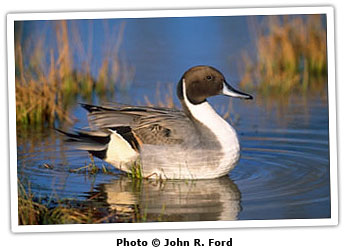 Avian influenza (“bird flu”) is a viral illness commonly found in certain wild bird populations, most notably waterfowl and shorebirds. Wild birds, including waterfowl and some shorebirds and seabirds, may carry a variety of avian influenza (AI) viruses and not show clinical signs of illness.
Avian influenza (“bird flu”) is a viral illness commonly found in certain wild bird populations, most notably waterfowl and shorebirds. Wild birds, including waterfowl and some shorebirds and seabirds, may carry a variety of avian influenza (AI) viruses and not show clinical signs of illness.
Few AI viruses are able to infect humans, but influenza viruses are highly dynamic and change over time. The Centers for Disease Control and Prevention (CDC) considers the risk to the general public from HPAI infection in wild birds, backyard birds, and commercial poultry to be low.
Occasionally, AI viruses change into forms that are deadly to domestic chickens and turkeys. These viruses are known as highly pathogenic avian influenza (HPAI) viruses, and the designation of “highly pathogenic” refers to its effect on domestic poultry, not humans or wildlife.
In January 2022, HPAI was detected in a hunter-harvested American green-winged teal and a hunter-harvested mallard. Both birds were harvested in Henrico County. In February 2022, a third detection was reported in an American wigeon from Virginia Beach. HPAI has also been recently detected in wild waterfowl from Newfoundland, Canada, and North and South Carolina.
There is no immediate public health concern with the HPAI viruses detected in Virginia.
Guidelines for Hunters
HPAI is a virus with the potential to cause significant economic losses to Virginia’s poultry industry. By following the guidance below, waterfowl hunters can do their part to keep domestic birds safe from this virus.
- Wear rubber gloves when cleaning game.
- Dress your game birds in the field whenever possible.
- If you must dress birds at home, clean them in an area that your poultry and pet birds cannot access.
- Keep a separate pair of shoes to wear only in your game cleaning area. If this is not possible, wear rubber footwear and clean/disinfect footwear before entering or leaving the area.
- Use dedicated tools for cleaning game, whether in the field or at home. Do not use those tools around your poultry or pet birds.
- Wash hands with soap and water immediately after handling game. If soap and water are not available, use alcohol wipes or an alcohol-based hand sanitizer.
- Double bag the offal and feathers. Tie the inner bag, and be sure to take off your rubber gloves and leave them in the outer bag before tying it closed.
- Place the bag in a trash can that poultry and pet birds cannot access. This trash can should also be stored away from children, pets, or other animals.
- Wash tools and working surfaces with soap and water, then disinfect with a 10% solution of chlorine bleach.
While the CDC considers the risk to the general public from HPAI infection in wild birds to be low, the following safety guidelines help to ensure that you minimize your exposure to HPAI and other diseases of wildlife.
- Do no handle or butcher birds that are obviously sick or are found dead.
- Avoid contact with urates, feces, and bodily fluids when plucking and cleaning birds.
- Do not eat, drink, or smoke while cleaning game.
- Wear rubber gloves and washable clothing when cleaning game.
- Wash tools and working surfaces with soap and water, then disinfect with a 10% solution of chlorine bleach.
- Keep uncooked game in a separate container, away from cooked or ready-to-eat foods.
- Wash hands thoroughly with soap and water or disinfectant wipes immediately after handling game. If soap and water are not available, use alcohol wipes or an alcohol-based hand sanitizer.
- Cook game meat thoroughly – birds should reach an internal temperature of 165°F as measured by a meat thermometer to kill disease organisms and parasites.
Guidelines for Individuals Finding Dead Birds
- DWRstaff have been notified to be extra vigilant for sick or dead raptors (hawks, eagles, owls), turkeys, and waterfowl (ducks, swans, geese).
- If you see a sick or dead raptor (excluding carcasses found on the road) or turkey, please notify DWR via the Virginia Wildlife Conflict Helpline at 855-571-9003.
- If you find five or more dead waterfowl in the same area within 1–2 days, please notify DWR via the Virginia Wildlife Conflict Helpline at 855-571-9003.
- If you find a dead song bird(s) or suspect that one of the species listed above died of trauma from hitting a stationary object (window, powerline) or moving vehicle (found on or near a road), or by predation (cat), do not call DWR and safely dispose of the bird using the guidelines below.
- To dispose of a dead bird, pick up the bird with an inverted bag or disposable glove, place the bird in another bag, and dispose of it in the trash. Trash receptacles should be secured so that children, pets and wild animals do not have access to them.
Additional Resources
- Centers for Disease Control and Prevention, Prevention and Treatment of Avian Influenza A Viruses in People
- https://www.cdc.gov/flu/avianflu/prevention.htm
- Center for Food Security and Public Health, Avian Influenza
- https://www.cfsph.iastate.edu/Factsheets/pdfs/highly_pathogenic_avian_influenza.pdf
- U.S. Department of Agriculture, 2022 Highly Pathogenic Avian Influenza
- https://www.aphis.usda.gov/aphis/ourfocus/animalhealth/animal-disease-information/avian/avian-influenza/2022-hpai
- U.S. Department of Agriculture, VS/WS, Guidance for Hunters – Protect Yourself and Your Birds from Avian Influenza
- https://www.aphis.usda.gov/publications/animal_health/2015/fsc_hpai_hunters.pdf

